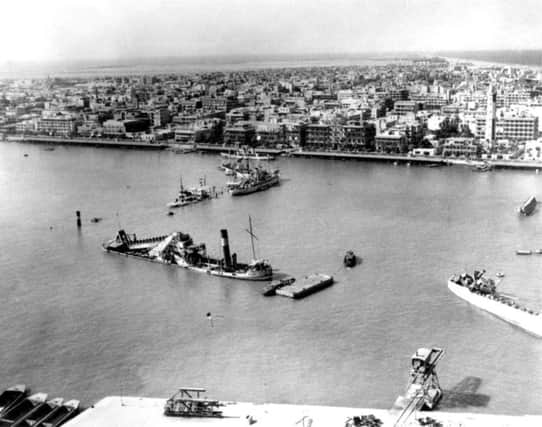Reliving terrors of Cyprus emergency


The former councillor begins by telling us how he left Britain for the Middle East via Southampton.
“We sailed for six or seven days and anchored at Suez,” recalls Mr Meeks.
Advertisement
Hide AdAdvertisement
Hide Ad“By the time we got there, the British and French navy had carried out a bombardment, and the RAF had also targeted key positions.
“We landed at Port Said, by way of landing craft, a day or so after the bombardment.”
Although most of the Egyptian resistance had been crushed by the bombardment, there were still dangers from a hidden enemy – snipers.
“Because I had been in the Merchant Navy, I was assigned to a motor launch.
Advertisement
Hide AdAdvertisement
Hide Ad“As well as taking engineers from ship to shore, we helped to clear the canal of wrecked and sunken ships.
“A lot of ships were sunk by the Egyptians to block the canal, and the dredgers had been scuttled.”
Mr Meeks was at Suez for five weeks, after which time he thought he would be heading back home, but instead, he was sent back to Cyprus due to the “emergency” then taking place on the island.
By the end of that crisis, 371 British service personnel had lost their lives.
Advertisement
Hide AdAdvertisement
Hide AdHistorians report that during the “emergency”, Greek Cypriot fighters, belonging to an organisation called Eoka, planted bombs and attacked British servicemen on and off duty. Several civilians were also killed.
“It was similar to what was happening in Northern Ireland,” explains Mr Meeks.
“In Nicosia, there was a street called Murder Alley, and if you went there on patrol, you were frightened. Lots of lads got killed there.
“We did our share of patrols, when we got sniped on, but there was no face-to-face confrontation. That can be more frightening because you don’t know where the shots are coming from.
Advertisement
Hide AdAdvertisement
Hide Ad“Cyprus could have been a good place to be based, but you couldn’t relax and socialise.
“A couple of the lads socialised with the locals and were shot and killed. You were terrified; it wasn’t a good feeling.”
Mr Meeks said he was shocked by the number of army personnel killed there.
One of the most disturbing incidents, as far as he is concerned, was when a young sergeant was killed at Polymedia Camp, in Limassol.
Advertisement
Hide AdAdvertisement
Hide AdThere, a local man left a bike (fitted with an explosive device) against the corrugated wall of a hut. It went off, killing the sergeant.
“When we went out, there were a lot of people running around,” remembers Mr Meeks.
“Our people rounded up all the civilians in the camp. I was only 19 at the time, and the sergeant, who was killed, was just 26. It brought home to us that we weren’t even safe in our own camp.”
However, despite the dangers, while he was in Cyprus, Mr Meeks’ regiment helped to make the landing strips at the air base, in Akrotiri, bigger and stronger.
He was finally demobbed in April, 1957.
Advertisement
Hide AdAdvertisement
Hide AdTo this day, he feels that the troops he served with in that conflict have been “forgotten” with the passing years.
“I think we need to do more to remember the people who fought in Cyprus.
“People should not forget what happened, and why it happened.”
Nor can Mr Meeks forget the “bullies” who made national service “truly dreadful”.
Advertisement
Hide AdAdvertisement
Hide AdHowever, he had the last laugh when the troops were being transported overseas.
“One good thing about the troop ship was seeing all those bullying sergeants and corporals being seasick, it was lovely.”
When Mr Meeks came out of the army, he did “various things” including rejoining the Merchant Navy and working as a trolley bus driver.
He later became transport manager and distribution manager at Crawfords Bakery, in Simonside, before working at Palmer Community Hospital, in Jarrow. He served as a councillor for 13 years.
l Did you serve in the Suez Canal crisis or in Cyprus?
Advertisement
Hide AdAdvertisement
Hide AdWere you involved in the war in Korea or the “troubles” in Northern Ireland? Please get in touch if you did.
l On Thursday, Les Crompton tells of his experiences while serving with the King’s Royal Hussars in Aden in 1957.